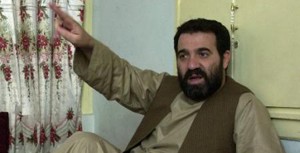By Tom Lasseter

The Times, November 24, 2007: "President Karzai's half-brother Wali, head of Kandahar's provincial council, continues to be accused by senior government sources, as well as foreign analysts and officials, as having a key role in orchestrating the movement of heroin from Kandahar eastward through Helmand and out across the Iranian border."
The Globe and Mail, May.3, 2008: The man considered by many observers to be the most powerful and feared figure in the Afghan south is not the Kandahar governor but rather Ahmed Wali Karzai, appointed by his brother, President Hamid Karzai, to represent Kandahar province in Kabul. A government document leaked to ABC News two years ago accused him of being the central figure in the region's vast opium-export market, which produces the majority of the world's opium and heroin.
New York Times, October 5, 2008: Numerous reports link Ahmed Wali Karzai to the drug trade, according to current and former officials from the White House, the State Department and the United States Embassy in Afghanistan, who would speak only on the condition of anonymity.
KANDAHAR, Afghanistan — The ride to Kandahar airport was tense. The Afghan president's brother had just yelled a litany of obscenities and said he was about to beat me.
Ahmed Wali Karzai is feared by many in southern Afghanistan, and being threatened by him, in his home, isn't something to be taken lightly.
In a place like Kandahar, I try to take precautions — letting my beard grow and wearing the traditional Afghan outfit of baggy pants and a long tunic — but at the end of the day, there's no protection when the most powerful official in the region orders you to leave.
So after a quick consultation with locals, I decided to do just that.
I was in my third week of tracking down former Afghan officials and asking them about drugs and corruption. Several had mentioned Karzai, President Hamid Karzai's brother and the head of Kandahar's provincial council.
After talking with poppy farmers, a drug dealer and former officials in Kandahar, it was time to see Ahmed Wali Karzai.
Sitting in his home, Karzai said up front that he had nothing to do with drugs. The political enemies of his brother, the president, were spreading rumors: "I am just the victim of their politics, that's all," he said.
I flipped from one page to the next of my notebook, and started with specifics.
Dad Mohammed Khan, a former national intelligence directorate chief of Helmand province, told me that Karzai had sent an intermediary to force him to release a Taliban commander who'd been arrested in a major drug-trafficking area. Khan was killed by a roadside bomb after our interview.
"He died, so I don't know if he told you that," Karzai said, looking unhappy with the question.
He added: "He's dead, so let's leave it there."
I moved on to a second former security official from the region — I had jotted a long list of names — who'd also made allegations about Karzai.
Karzai said that the official "is alive, I can find him and talk to him." He called for one of his men to bring a cell phone.
He began to glare at me and questioned whether I was really a reporter.
"It seems like someone sent you to write these things," he said, scowling.
Karzai glared some more.
"You should leave right now," he said.
[utubew]E5PDowAjCVo[/utubew]I stuck my hand out to shake his; if I learned anything from three years of reporting in Iraq and then trips to Afghanistan during the past couple of years, it's that when things turn bad, you should cling to any remaining shred of hospitality.
Karzai grabbed my hand and used it to give me a bit of a push into the next room. He followed me, and his voice rose until it was a scream of curse words and threats.
I managed to record just one full sentence: "Get the (expletive) out before I kick your (expletive)."
I won't describe the rest, because it involves the Afghans I was working with, none of whom wants to risk revenge in a country where feuds often end in blood.
Once I was at the airport, there were still several hours until the flight and I had only fuzzy ideas of what to do if the plane to Kabul were canceled, a common occurrence.
I was with my Afghan colleague, and neither of us talked much. It's a routine that we've worked out, the silence in which we collect ourselves and let the fear settle.
After several hours of delay — there was speculation about whether there was no fuel, or a government minister was running late — the plane finally took off.
I looked out the window, and there was Kandahar below. A few minutes later, I looked again, and it was gone, leaving only the darkness of the Afghan night. The trip back to Kabul was a quiet one.



